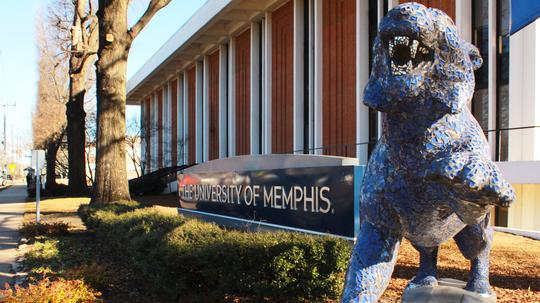
In fiscal year 2021, the University of Memphis surpassed a new milestone, eclipsing $50 million in research awards for the first time. As the school’s EVP of research and innovation Jasbir Dhaliwal put it, faculty members were “thinking bigger,” proposing more ambitious projects than before.
So far, it doesn’t seem like that appetite for major awards has been satisfied in early fiscal year 2022. Because in September, U of M staffers continued to score six and seven-figure research grants for their projects — one of which is particularly relevant in a pandemic.
Along with researchers from Virginia Tech, University of San Diego, and University of Connecticut, U of M biological sciences professor Jim Adelman has been awarded a $1.75 million grant to study variation in host susceptibility to infectious diseases. A four-year study, it’s funded by the National Institute of General Medical Sciences.
“As we’ve all seen recently, there’s a ton of variation in who gets sick after exposure to a pathogen,” said Adelman, in a press release. “Those differences in susceptibility are what this project is all about: how that variation arises and what its consequences are for pathogen spread and evolution.”
Here’s a more detailed explanation, in case that quote doesn’t quite give you an understanding of the project.
Everyone in a population is different. And those differences — whether we’re talking age, genetics, acquired immunity, or even the coarseness of nose hairs — make you either more or less susceptible to a pathogen infection. Prior exposure to a pathogen also affects this susceptibility, and the collective differences of individuals can lead to a certain level of variation among the entire population.
This variability can protect a population against outbreaks and community transmission. What’s not known, however, is what level of variability best protects a population — or how much prior exposure in a population makes a difference in that variability.
So, Adelman and a team of researchers will study house finch populations, to test and model how different degrees of prior exposure to a common pathogen affect the variation in their populations.
“We can test existing theory using finches from natural populations, in safely controlled settings, and then translate those findings into new mathematical models,” Adelman said. “Models that could prove critical for predicting outbreaks not only in wildlife, but also in domestic animals and even humans.”
Research clusters
Adelman isn’t the only U of M professor who has a new research award to boast about. According to the school’s research and innovation newsletter, more than 25 faculty members received grants in September, five of which were valued at over $500,000.
For example, Cyber Security professor Dipankar Dasgupta was awarded $1.01 million and $251,346 grants from the National Security Agency, for his projects “Cybersecurity education for critical infrastructure protection (in community development) through regional coalition,” and “Developing application-specific shared-trust framework for accessing sensitive information.”
And Melissa Hirschi, an assistant professor in Department of Social Work, was awarded grants worth $544,268 and $299,829 from the Health Resources and Services Administration, for her projects “Peers Engaging and Empowering Recovery (PEER)” and the “Memphis opioid workforce paraprofessional expansion program.”
The increase in research awards bodes well for the school’s push to gain R1 status from the Carnegie Classification of Institutions of Higher Education, as the amount of research expenditures is a key part of gaining R1 status, and more awards lead to more expenditures.
Because the updated list of R1 institutions will come out this fall, U of M has already submitted data for consideration, and these grants won’t be considered for the rankings.
However, once R1 status is gained, an institution must maintain it — the distinction can be lost — and new lists are released every three years.








